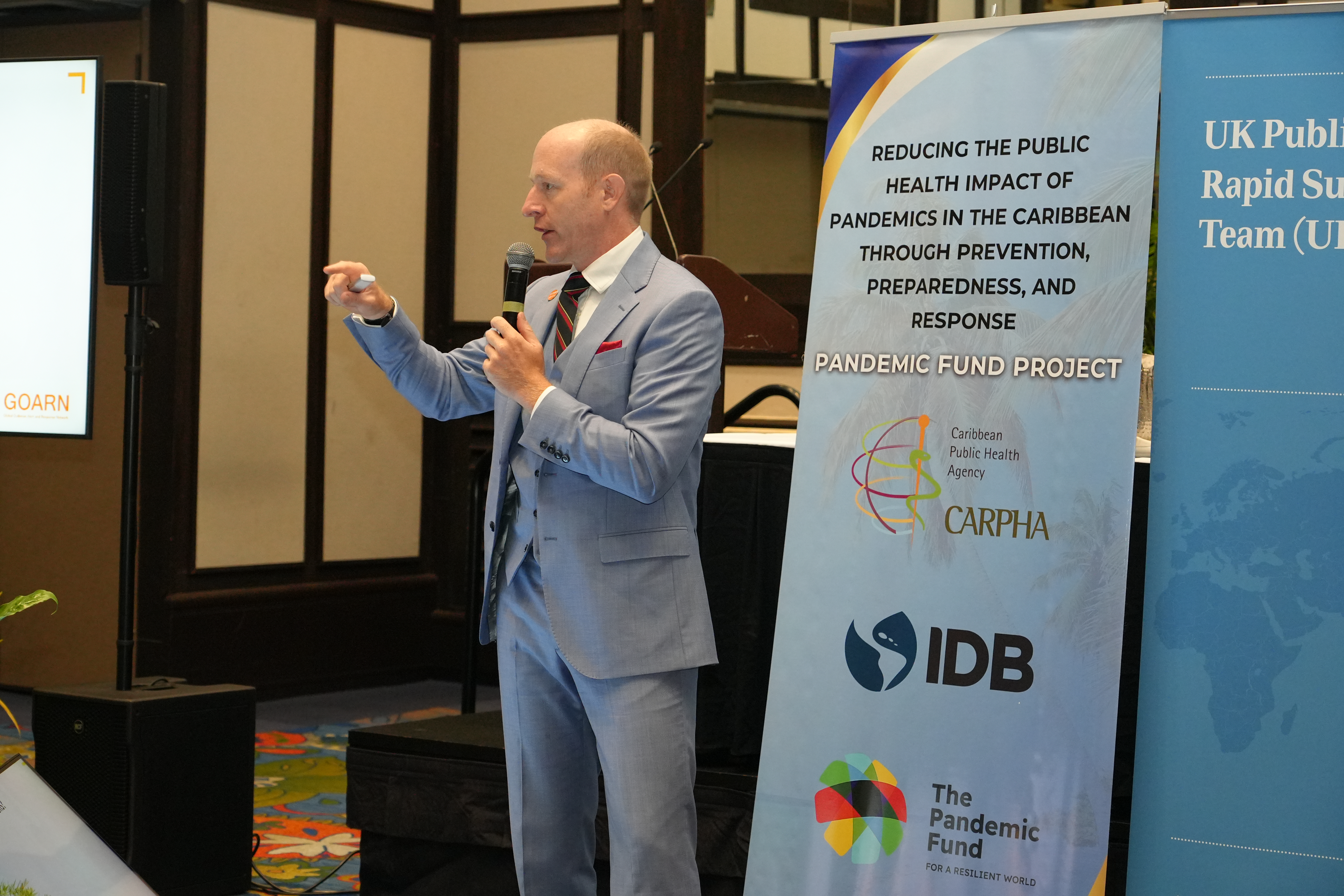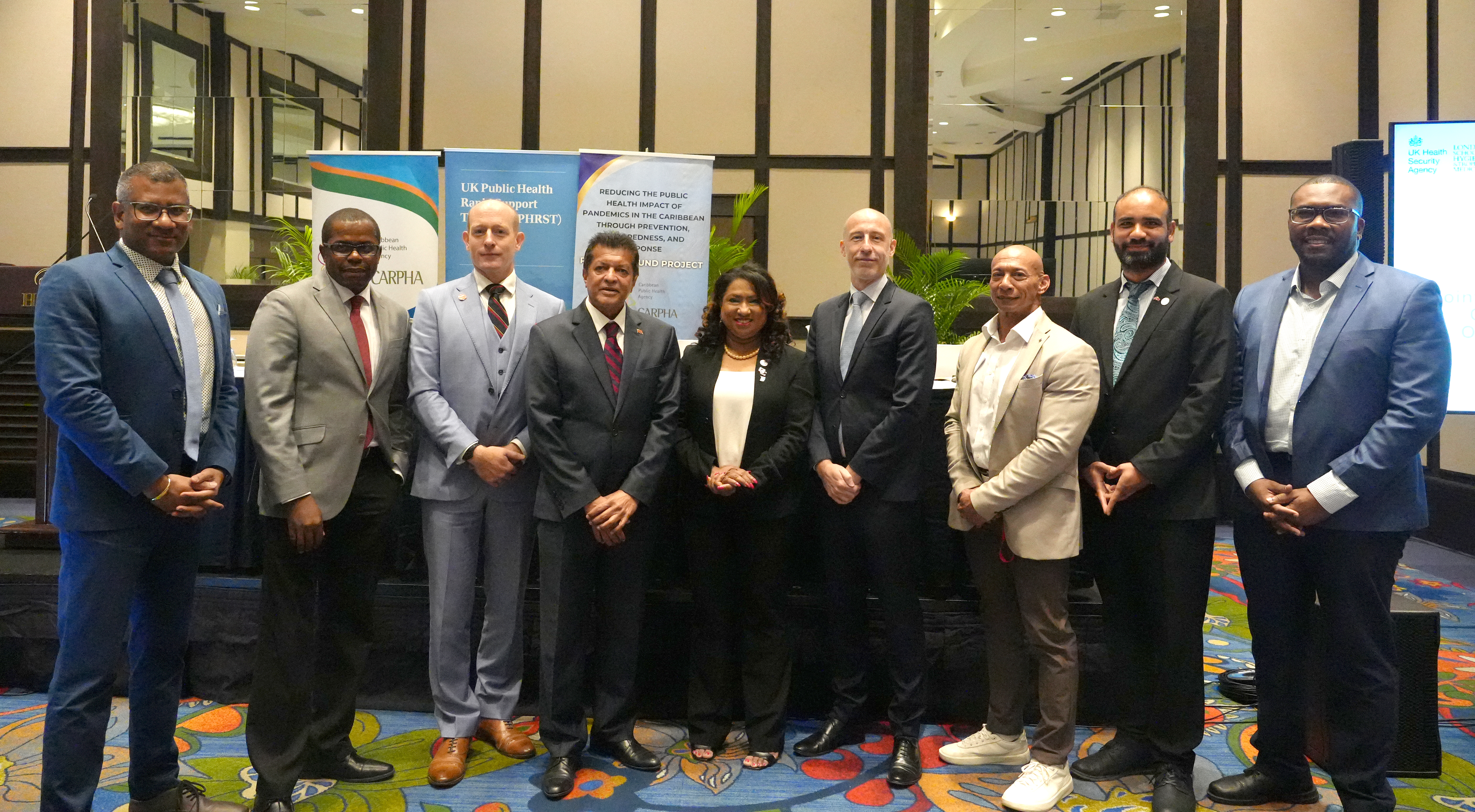
The UK Public Health Rapid Support Team, working alongside the Global Outbreak and Response Network (GOARN), has successfully delivered the GOARN Tier 1.5 Orientation to National and International Outbreak Response Workshop for the first time.
In collaboration with the Caribbean Public Health Agency (CARPHA), 34 public health professionals including CARPHA personnel based in Trinidad and Tobago and representatives spanning 10 Member States took part in the training. Attendees included emergency response focal points from ministries of health, public health surveillance officers, laboratory professionals, and specialists in risk communication and One Health - marking a significant step forward in strengthening the region’s capacity to respond rapidly and effectively to public health emergencies.
The three-day event - consisting of two outbreak response workshops back-to-back – involved classroom-based training using scenarios, case studies, presentations and discussions followed by an evaluation workshop of CARPHA’s response plans and mechanisms.
These intensive workshops were designed to help close identified gaps in the region’s emergency response architecture, particularly in relation to the deployable response workforce, internal operational processes, and multisectoral coordination mechanisms. The response plan review then examined CARPHA’s capacity and capability to respond, using relevant scenarios to stress test existing plans and procedures, clarify roles and decision-making arrangements, and identify practical improvements in multisectoral coordination.
UK-PHRST was able to deliver this workshop through a carefully selected team of facilitators who themselves recently completed the GOARN Tier 1.5 training. The UK-PHRST team combines extensive GOARN and WHO field experience with proven adult learning expertise and includes former deployees who provide authentic insights into the realities, challenges, and rewards of international outbreak response work.
Dr Ed Newman, Director of UK-PHRST and Co-Deputy Chair of the GOARN Steering Committee, noted the lasting value of the programme:
“We’re delighted to partner with CARPHA on this initiative in support of their vision to expand regional Public Health Emergency Response capacity and capability. Working alongside GOARN, we’re proud that UK-PHRST has the expertise to deliver these workshops, sharing our learning and experience and that of our partners - helping ensure CARPHA and its Member States are better equipped to respond to future public health emergencies. This partnership demonstrates the power of international collaboration in building resilient public health response systems and reflects our shared commitment to strengthening global health security.”
Dr Ed Newman, Director of UK-PHRST speaking at the launch of the workshop. Image credit: CARPHA
Dr. Lisa Indar, Executive Director of CARPHA, praised the collaborative effort and its impact:
“These workshops strengthen our collective readiness to face the next public health emergency. By enhancing the skills of our regional deployers and testing our coordination protocols under realistic conditions, we are ensuring that CARPHA and its Member States can respond quickly and decisively when outbreaks occur. Our continued priority is the safeguarding of lives and protection of our livelihoods.”
British High Commissioner to Trinidad and Tobago, H.E. Jon Dean added “The UK is proud to have supported this important initiative through the UK Public Health Rapid Support Team, in close partnership with CARPHA and WHO GOARN. The training represents a meaningful step toward strengthening the speed and effectiveness of public health emergency responses in Trinidad and Tobago and across the Caribbean. This collaboration reflects the UK’s enduring commitment to regional cooperation, resilience, and shared learning with the Caribbean"
The knowledge and skills gained during the workshops will now be integrated into national public health systems, expanding the region’s pool of professionals who are trained, tested, and ready for rapid deployment. By building a skilled and responsive health emergency workforce and testing coordination protocols under realistic conditions, this initiative is supporting the long-term sustainability of emergency preparedness in the region.
The workshop brought together senior leadership from CARPHA, Ministries of Health from Trinidad and 10 Member States, CARPHA’s Pandemic Fund delivery partners at the Inter-American Development Bank, the British High Commission to Trinidad and Tobago, and UK-PHRST. Image credit: CARPHA


Please Sign in (or Register) to view further.